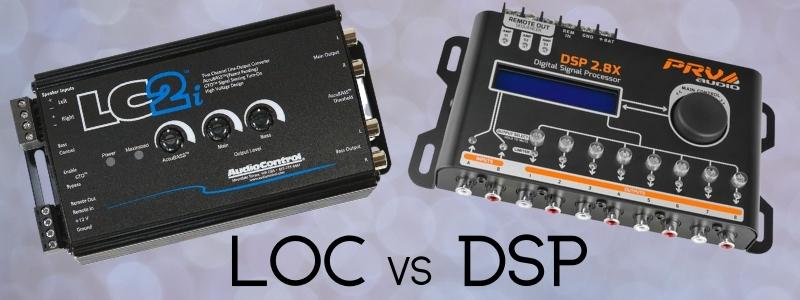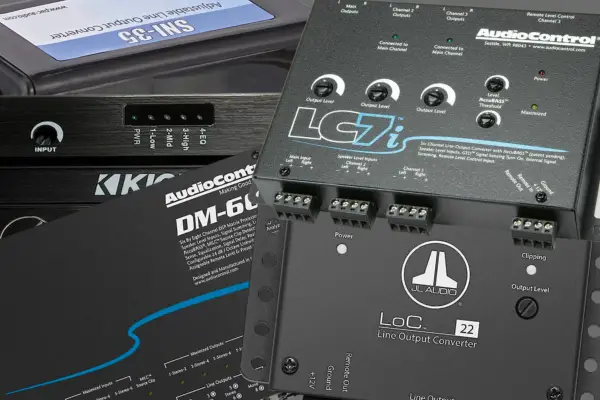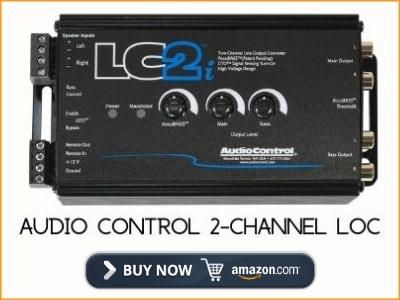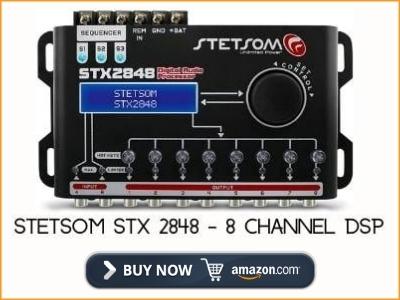LOC vs DSP – Which to Get for a Car Stereo System?
In the LOC vs DSP debate the first thing to remember is that not all LOCs or DSPs are made equal. So, whichever one is best for you, remember: you get what you pay for.
But, of the two which one is best for a car stereo system? And is there even a Line Output Converter vs Digital Signal Processor debate?
Most people who need a Line Output Converter (LOC) or Digital Signal Processor (DSP) need one because they don’t want to replace their OEM factory head unit.
And if you want to bulk up your car stereo system without replacing the head unit then an LOC or a DSP will likely be necessary. These two devices allow us to take a factory signal and convert it from speaker level to RCA low level.

So, which one should you get? What is best in the LOC vs DSP debate? Well, as with most things in the car audio world, the correct answer is determined by each individual set up and the tools you have.
Both a Line Out Converter and Digital Sound Processor make a big impact in an aftermarket car stereo set up, but they offer different outcomes. So, before we work out the winner, let’s take a closer look at the features of both an LOC and DSP.
What is a Line Output Converter (LOC)?
Line Output Converters come in Active or Passive, with Active being the more advanced and give a stronger output voltage, which means you should get a cleaner signal. And they’re what most people go for when building an aftermarket car stereo system.
An LOC basically scales down the voltage from speaker level down to an RCA low-level voltage, and sends it down to your amplifier, which needs a lower voltage to perform.
Not all Line Out Converters are made equally of course, and you can get them with as many channels as you need. So, if it’s a full car stereo system that you’re building make sure you get one with enough channels
What is a Digital Signal Processor (DSP)?
A Digital Sound Processor does a similar job as an LOC as it also allows you to connect your factory head unit and converts the speaker level into a low-level RCA connection, which then runs to your amplifier.
But there’s more to a DSP than the odd dial to control the signals and your soundstage. A DSP allows you to really manipulate things like the signal’s timing, crossover control, and even control the equalization of every individual output channel.
Why Choose a DSP Over an LOC?
DSPs are more advanced and you can manipulate the sound output much more with one. As you’re probably using a factory head unit, a DSP will allow you to do things with the built in OEM equalizer that an LOC can’t.
For example, most OEM manufacturers will apply their own EQ curve to their speakers, so the EQ won’t be flat and instead will have the custom EQ curve that was made to make the factory speakers sound optimally.
Of course, that EQ curve isn’t ideal for all set ups and when you upgrade your stereo system, you’ll want to retune your EQ and get the right curve for your set up.
With a DSP, you can do this on your laptop or smartphone and really create the right EQ curve you want, which isn’t possible with an LOC.
Time Alignment is another Digital Sound Processor feature that LOCs don’t. This feature allows you to delay the signal release of speakers.
For example, all speakers are at a slightly different distance from you as you sit in your car seat, and so when the sounds are produced they actually hit you at slightly different times.
With Time Alignment you can delay the speakers that are closer to you, so that every beat and every tone from each speaker will actually hit you at exactly the same time.
So, if a Digital Signal Processor has better features, Why the LOC vs DSP debate?
Why Choose an LOC Over a DSP?
You can do much more with a DSP, so why would anyone choose an LOC instead?
LOCs are quite a bit cheaper than DSPs and they’re easier to install. They also do a great job at amplifying your sound, and they also give you some control over the signal manipulation, just not as deep as a Digital Sound Processor.
But if you don’t have the right tools to get the best out of your DSP, which are expensive, then you won’t achieve all the benefits.
When you set up a DSP, you’ll need other things such as an RTA (Real Time-Analyzer) to reach its full potential, and without one you may as well go for the cheaper LOC.
LOC vs DSP
There’s no real LOC vs DSP debate in the qualities of each device, because you can do much more with a Digital Signal Processor than you can with a Line Out Converter.
But they’re both very useful, and I guess it depends how serious you are at sculpting the very soundstage you desire.
For most people louder and clearer music is enough, and this is achieved with an LOC and an aftermarket amplifier.
But if you need features like Time Alignment and full control over the factory EQ to ensure the sound is sculpted precisely the way you desire, then a DSP will be necessary.
For most people, a Digital Signal Processor is overkill, but if you’re a true audiophile, then it has to be a DSP over LOC.

I am a passionate and skilled car audio enthusiast with 15 years of experience in the industry. My journey started when I replaced my first set of factory car speakers, sparking a deep love for high-quality sound. Since then, I have worked as a representative for renowned brands like Kenwood and Alpine.
With a background in both retail and distribution, I have developed a comprehensive understanding of the car audio market. Currently a certified (MECP) installer in the Mobile Electronics industry, my expertise lies in delivering top-notch audio installations. My knowledge, coupled with my genuine passion, makes me the go-to professional for all car audio needs.



